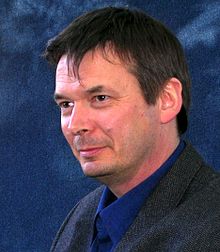Which d'you fancy?
Gruesome detail?
or
Cosy Crime?
Recently, Rebus creator Ian Rankin forecast that extreme bad news in the real word is killing it off the violent thriller. In the Scottish paper, the Daily Record, Rankin claims that the rise of Donald Trump, terrorist attacks and mass shootings have left people yearning for 'kind and gentle' books…The world seems so crazy and irrational that many novelists have difficulty trying to shape it into a coherent narrative…Fiction must be credible, the real world right now feels to me like the opposite of that. People crave normality and stories of kind people helping each other… He added…I think this may happen – a move away from serial killers and bleak dystopian crime fiction towards something with a more comforting message...
 |
| source; https://en.wikipedia.org/wiki/Ian_Rankin |
Interviewed on the BBC Radio Four Today Programme, Simon Kernick, with 15 novels under his belt, including The Hanged Man, 2017 and The Bone Field, 2016, suggested that…books where there’s a good level of tension but there isn’t the nastiness, such as Big Lttle Lies [by Liane Moriarty] are more comforting to the reader… Asked if he was tempted to tone it down himself, he admitted…I now prefer to write books where I rely heavily on the tension rather than the nastiness.
Denise Mina, who writes the Alex Morrow Books, suggests that one of the reasons why crime fiction is compelling is because that a belief in a just world is fundamental to human beings, and that is what most crime fiction affirms…In all the evidence that life is not fair, we have this fundamental belief…and she suspects that…In these very grizzly ones there isn’t a restoration of order. It's often leaving things open at the end in order to continue a series…
I must admit I like the books I read – and the books I write – to have a just and fair ending, with a denouement that’s believable as well as gripping. And although I can 'take' a certain level of blood and gore, I don't need it. The beauty of the language and the profoundness of the characterisation is far more important.
I’ve just finished Odd Child Out by Gilly Macmillan (HarperCollins), and it’s a perfect example of this. Set vividly in my home town of Bristol, it’s about fifteen year old Noah, found floating unconscious in the Feeder Canal, and his best friend Abdi Mahab, whose parents arrived in Britain after terrifying experiences in a Somali refugee camp. I don’t think it’s a spoiler alert to tell you the book ends by affirming there is justice in the world, and that those who deserve a better chance in life should be offered it. The parents of both the teenaged friends have to face personal suffering, and their own demons, before the case is resolved by Jim Clemo, returning for his second case in Macmillan’s series. This is a police procedural at its heart, with Clemo and his team arduously sorting through lost iPhone records, searching out CCTV images and interviewing recalcitrant witnesses, as they determine if foul play, or even a racially motivated crime, has been committed. But to balance this, Macmillan includes a host of different points of view – first and third – to allow the various characters to have their say. This is a precarious device for a crime novelist, but it worked perfectly for me, allowing me to hear Noah’s story as he drifts in his deep coma, as well as see into the personal life of the detective, Clemo. Each of the Mahab family…the high achieving Abdi, his sister Sofia, now a midwifery student, his taxi-driving father Nur and his mother, Maryam, who speaks little English…all offer important perspectives to the story.
This is not a book that has high octane gun fights or car chases. Instead it steadily delves into the lives of ordinary people who find themselves in extraordinary circumstances, just as I have tried to do in my Shaman Mystery trilogy. It is a study of human nature and human dilemmas, deeply absorbing and full of tension and suspense.
This is certainly not ‘cosy crime’, but neither is it filled with gruesome gore. It’s not even clear, at first, if anyone is going to die at all, and then, suddenly, a lot of people are in danger. By the end, I was gripping my Kindle as if that would help the good guys survive.
Gilly Macmillan lived in Northern California in her late teens, but now she’s in Bristol (West of England) and writing full time. You can hear her talk about her previous book, The Perfect Girl, at https://soundcloud.com/harperaudiopresents/gilly-macmillan - in a very revealing interview. It's already downloaded onto my Kindle and I can't wait to start the read.





I would go for cosy over gruesome, but I enjoy cutting edge suspense and psychological thrillers. What I don't enjoy is a succession of gruesome murders with victim number umpteen saved when they finally work out the clues or the murderer's message! Forensic annalysis of putrifying flesh does not appeal either.
ReplyDelete